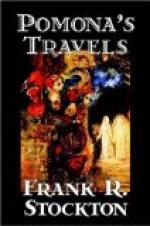As we didn’t go to the Abbey, and was so long making up our minds where we should go, it got too late to go anywhere, and so we stayed in the hotel and looked out into a lonely and deserted street, with the wind blowing the little leaves and straws against the tight-shut doors of the forsaken houses. As I stood by that window I got homesick, and at last I could stand it no longer, and I said to Jone, who was smoking and reading a paper:
“Let’s put on our hats and go out for a walk, for I can’t mope here another minute.”
So down we went, and coming up the front steps of the front entrance who do you suppose we met? Mr. Poplington! He was stopping at that hotel, and was just coming home from church, with his face shining like a sunset on account of the comfortableness of his conscience after doing his duty.
Letter Number Sixteen
BUXTON
When I mentioned Mr. Poplington in my last letter in connection with the setting sun I was wrong; he was like the rising orb of day, and he filled London with effulgent light. No sooner had we had a talk, and we had told him all that had happened, and finished up by saying what a doleful morning we had had, than he clapped his hand on his knees and said, “I’ll tell you what we will do. We will spend the afternoon among the landmarks.” And what we did was to take a four-wheeler and go around the old parts of London, where Mr. Poplington showed us a lot of soul-awakening spots which no common stranger would be likely to find for himself.
If you are ever steeped in the solemnness of a London Sunday, and you can get a jolly, red-faced, middle-aged English gentleman, who has made himself happy by going to church in the morning, and is ready to make anybody else happy in the afternoon, just stir him up in the mixture, and then you will know the difference between cod-liver oil and champagne, even if you have never tasted either of them. The afternoon was piled-up-and-pressed-down joyfulness for me, and I seemed to be walking in a dream among the beings and the things that we only see in books.
Mr. Poplington first took us to the old Watergate, which was the river entrance to York House, where Lord Bacon lived, and close to the gate was the small house where Peter the Great and David Copperfield lived, though not at the same time; and then we went to Will’s old coffee-house, where Addison, Steele, and a lot of other people of that sort used to go to drink and smoke before they was buried in Westminster Abbey, and where Charles and Mary Lamb lived afterward, and where Mary used to look out of the window to see the constables take the thieves to the Old Bailey near by. Then we went to Tom-all-alone’s, and saw the very grating at the head of the steps which led to the old graveyard where poor Joe used to sweep the steps when Lady Dedlock came there, and I held on to the very bars that the poor lady must have gripped when she knelt on the steps to die.




